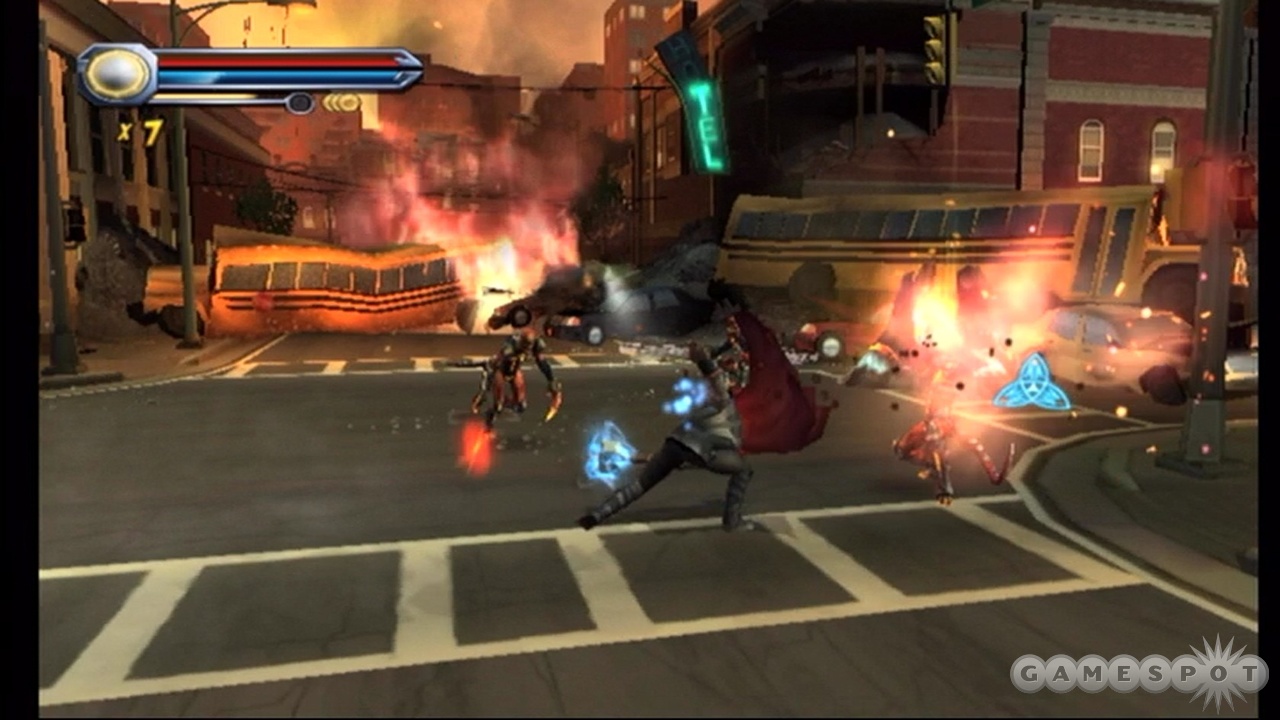An ordinary person might look at a hammer and see a blunt instrument that could be used to pound nails into a rocking horse or swing set. But if you're a Norse god, a hammer is far more useful as a bludgeoning device against your mortal enemies. In Thor: God of Thunder, you swing your mighty weapon with a gung-ho, everything-must-be-smashed attitude that only those of divine parentage can pull off without serious repercussions. Fire demons, ice giants, and even stalagmites crumble before your unbridled wrath, with the only reprieve from your hammering action coming when you summon bolts of lightning or gusts of wind to employ a dose of elemental chaos. This mash-happy game contains little diversity or strategy, focusing on Thor's maniacal destructive abilities as you swing your way through a seemingly never-ending horde of enemy forces. Thor: God of Thunder contains the turn-off-your-brain fun present in many brawlers, but tiring repetition drags even immortals back to Earth.
Interspersed between your bouts of heedless carnage is a story that explains exactly what got stuck in Thor's craw. At the beginning of your journey, Thor's longtime companion Sif appears to die before his eyes. After quickly passing through denial and anger, Thor lands on the third stage of grief: bargaining. He rolls the dice in a big way to bring his fallen friend back to the land of the living. Of course, you can't just resurrect the dead without paying a heavy price, and the coin for this favor is total annihilation of all beings, from immortal gods to the common man. That's what you get for thinking with your hammer instead of your brain. Even though you want to grab Thor and shake him for his stupidity in the early going, he does eventually redeem himself, which makes him sympathetic enough to get invested in his tale. The cutscenes take advantage of Thor's comic book roots to present a story that is immediately striking. Lightly animated frames detail this world and characters in an eye-catching way, giving God of Thunder its own personality that separates it from similar games.
Sadly, the combat isn't as unique as the presentation. If you enjoy mindlessly smashing enemies and objects with a mythical hammer, you're in luck because there's little to do in this hack-and-slash adventure aside from mash the A button and watch things burst into tiny pieces. Levels comprise cavernous walls made from ice, buildings, and other such obstructions, and you make your way through these narrow confines by bashing the animate and inanimate alike. Cars and rocks can be blown to smithereens with one hearty swing of your crushing cudgel, but it's the swarming foes you need to contend with first. Thor has rattled the hornet's nest, and there seems to always be a new enemy just asking for you to swat it down. It's tiring tapping the same button repeatedly while your weak opponents fall before you, though you do have access to supermoves that inject some energy into conquests. Every hit you land raises the counter on your combo meter, and when you reach a certain level, you unleash flashy moves that can quickly clear the screen of evil. These range from sizzling electrical strikes to swirling tornado torments, and you unlock more moves as you progress through the game. Even though you still don't have to put much thought into your attacks, building your combo meter to unleash your godlike powers delivers a nice visual reward for your efforts.

Aside from the standard hack-at-everything-in-sight action that makes up the majority of this adventure, there are flying sequences that present your relentless destruction in new ways. These forced-scrolling stages have you casting electrical blasts on your attackers while you gracefully dodge their attempts to fight back. The simple structure would be boring in long doses, but these soaring forays do a good job of mixing in some much needed diversity without overstaying their welcome. There are also colossal bosses to contend with, and though it's not difficult to bring down your oversized foes, it can be fun to topple these behemoths as if they were just another low-level grunt. Quick-time events are a key component of the various boss fights. After you whittle down their health with standard attacks, your powerful adversaries are left open for a screen-shaking attack. You grapple on to their imposing frames with the tap of a button and then deal out massive punishment by swinging the Wii Remote in the specified direction. God of Thunder gives you adequate time to perform these actions, and striking bosses into the next plane of existence may momentarily make you feel a god.
As you progress through the adventure, you gain access to new supermoves, along with runes that imbue you with helpful buffs and upgrades to your health and magic powers. These serve as small bonuses for finishing enemies with panache or discovering hidden collectibles buried beneath the many destructible elements, but they're not enough to give the game the depth it sorely lacks. God of Thunder captures the mindless joy of vanquishing enemies much weaker than you, but its appeal stretches no further. There's not enough diversity in the combat to keep this adventure entertaining for long, and the brief flying sequences and boss fights look fancy, but they're just as shallow as every other aspect. Thor: God of Thunder is a respectable digital representation of this angry god's plight for justice, but it's ultimately held back by its overly simple action.